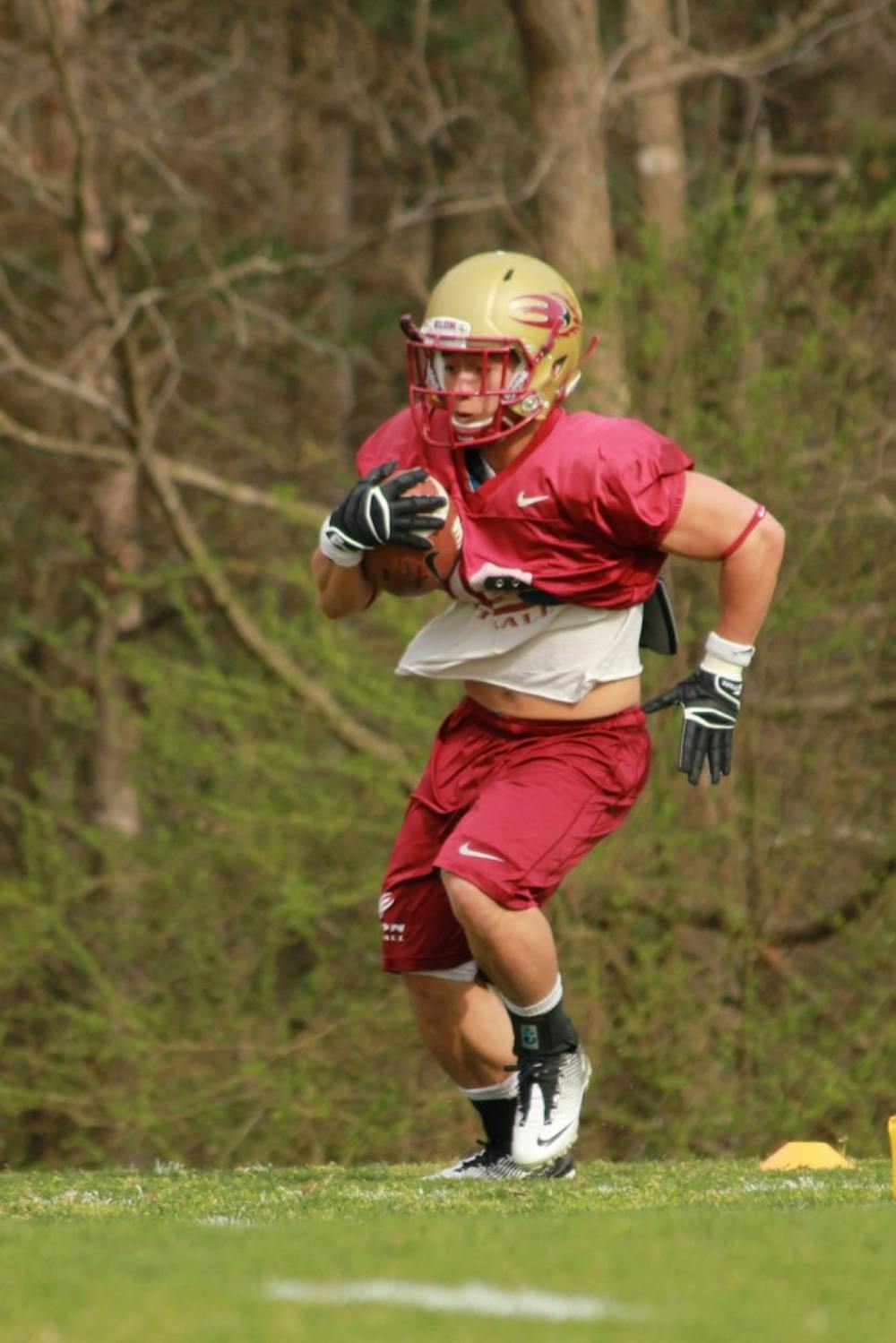“Atlanta! Atlanta! Go!”
The snap count of Elon University football junior quarterback Mike Quinn rings through the air of the Hunt and Tucker practice fields on a Monday afternoon.
At Elon, spring football in 2014 takes on extra significance thanks to the offseason coaching change from former head coach Jason Swepson to new leader Rich Skrosky.
Elon opened spring practice March 31 with the first session on the practice fields. The spring season will conclude April 26, when Elon holds its annual spring game in Rhodes Stadium.
In-season in the offseason
The NCAA regulates the amount of time teams are allowed to hold mandatory team functions. During the season, that number is at 20 hours per week, but from December through March, the number is reduced to eight hours per week. NCAA rules permit Division I football teams to hold 15 spring practices, including two scrimmages and a spring game. During spring practice, the number returns to 20 hours. Players get the feel for the season, though the end goal of each week is a little different.
“Knowing that there’s not a game on Saturday is definitely different than during the season,” said junior linebacker Odell Benton.
The team went through a rigorous set of weightlifting workouts and conditioning during the eight-hour weeks. All that preparation would lead to the extended spring season, but first, some changes needed to be made.
Adjusting schemes and working them in
As with any coaching change, Elon changed its terminology and systems on both offense and defense.
“Everything is totally different,” Skrosky said. “It’s kind of like going into a classroom and having to learn something in a new language. There might be some things they’re familiar with, but there’s a different word for it. That saps the natural ability of the athlete until they get comfortable hearing it.”
Because previous special teams coach Scott Browne was retained and moved to running backs coach, much of Elon’s kicking game and special teams terminology has remained the same.
After several meetings, it was time to take the field and put the new terminology to work. In the last of those meetings, Skrosky laid a simple goal for his team over the course of spring practice.
“What I told the team was to get the foundation of the offense, defense and special teams in,” Skrosky said. “When they leave, they’ve got to be very comfortable with that foundation. After 15 practices, I want myself and the staff to be able to evaluate and say ‘here is where our people are at.’”
For the defense, laying that foundation meant working with new defensive coordinator Jerry Petercuskie, a coaching veteran who has had stints at Boston College and North Carolina State University. Petercuskie has brought a simple defensive style that allows the defense to just “play football,” as Benton said.
“He tells us all the time that the game is easy, but it’s hard at the same time,” Benton said. “It’s easy to know the plays but it’s hard to do what we do. He gives us a sense of ownership of the defense.”
Petercuskie will be the third defensive coordinator (following Ed Pinkham and Brad Sherrod) that Benton has played under during his time at Elon.
Back to square one
One of Skrosky’s first tasks as the new head coach was roster management. Throughout this process, in which he evaluated all of the returning talent on the team, Skrosky did not set a depth chart. Instead, he told all of his players that they were “starting from zero,” meaning that every returning starter had to re-earn his job and every player on the roster had the chance to earn playing time. As the players took the field for spring practice, Skrosky said the competition would “light a fire under [them].”
For the veterans, the concept of “starting from zero” meant a return to the competition they saw earlier in their careers. Quinn competed with sophomore John Loughery for the starting quarterback job in the spring and summer of 2013 and eventually won the battle. Quinn pointed to that competition as a source of his improvement as a quarterback and said he hopes this year will bring more of the same.
“It will impact me positively,” he said. “Going back to last spring and summer, competing with John Loughery made us both better, and luckily, I came out on top. Hopefully the same thing happens: We make each other better, and at the end of the day, whoever can throw the ball better and read the defense better will get the job.”
Benton agreed, adding starters with job security can get “complacent,” so competition provides them with a boost.
“It brought out the competitiveness to make me a better player,” he said.
Summer matters
Skrosky said he expects his team to master their fundamentals before the spring game, and then the depth chart will become a point of focus.
“We’re going to let it go through all 15 practices and then through the summer,” he said. “The summer has become so important in Division I football.”
Skrosky said that during his time at Ball State University, where he previously served as offensive coordinator, he learned to observe how greatly players could improve over the course of the summer workouts. After the spring game, those sessions will be all that separates Skrosky from coaching his first season at the helm of the Phoenix.
Elon will visit Duke University Aug. 30 to open the 2014 season. Even though that game is more than four months away, spring practice will help lay the foundation for the journey ahead.


